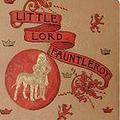Chapter 6 (7)
"Are you going to write him a letter now?" inquired Fauntleroy. "Shall I bring you the pen and ink? I can take the game off this table." It plainly had not for an instant occurred to him that Newick would be allowed to do his worst.
The Earl paused a moment, still looking at him. "Can you write?" he asked.
"Yes," answered Cedric, "but not very well." "Move the things from the table," commanded my lord, "and bring the pen and ink, and a sheet of paper from my desk." Mr. Mordaunt's interest began to increase. Fauntleroy did as he was told very deftly. In a few moments, the sheet of paper, the big inkstand, and the pen were ready.
"There!" he said gayly, "now you can write it." "You are to write it," said the Earl. "I!" exclaimed Fauntleroy, and a flush overspread his forehead. "Will it do if I write it? I don't always spell quite right when I haven't a dictionary, and nobody tells me." "It will do," answered the Earl. "Higgins will not complain of the spelling. I'm not the philanthropist; you are. Dip your pen in the ink." Fauntleroy took up the pen and dipped it in the ink-bottle, then he arranged himself in position, leaning on the table.
"Now," he inquired, "what must I say?" "You may say, 'Higgins is not to be interfered with, for the present,' and sign it, 'Fauntleroy,'" said the Earl. Fauntleroy dipped his pen in the ink again, and resting his arm, began to write. It was rather a slow and serious process, but he gave his whole soul to it. After a while, however, the manuscript was complete, and he handed it to his grandfather with a smile slightly tinged with anxiety.
"Do you think it will do?" he asked.
The Earl looked at it, and the corners of his mouth twitched a little.
"Yes," he answered; "Higgins will find it entirely satisfactory." And he handed it to Mr. Mordaunt.
What Mr. Mordaunt found written was this:
"Dear mr. Newik if you pleas mr. higins is not to be intur feared with for the present and oblige. Yours rispecferly,
"FAUNTLEROY." "Mr. Hobbs always signed his letters that way," said Fauntleroy; "and I thought I'd better say 'please.' Is that exactly the right way to spell 'interfered'?" "It's not exactly the way it is spelled in the dictionary," answered the Earl. "I was afraid of that," said Fauntleroy. "I ought to have asked. You see, that's the way with words of more than one syllable; you have to look in the dictionary. It's always safest. I'll write it over again." And write it over again he did, making quite an imposing copy, and taking precautions in the matter of spelling by consulting the Earl himself.
"Spelling is a curious thing," he said. "It's so often different from what you expect it to be. I used to think 'please' was spelled p-l-e-e-s, but it isn't, you know; and you'd think 'dear' was spelled d-e-r-e, if you didn't inquire. Sometimes it almost discourages you." When Mr. Mordaunt went away, he took the letter with him, and he took something else with him also—namely, a pleasanter feeling and a more hopeful one than he had ever carried home with him down that avenue on any previous visit he had made at Dorincourt Castle.
When he was gone, Fauntleroy, who had accompanied him to the door, went back to his grandfather.
"May I go to Dearest now?" he asked.
"I think she will be waiting for me." The Earl was silent a moment.
"There is something in the stable for you to see first," he said. "Ring the bell." "If you please," said Fauntleroy, with his quick little flush. "I'm very much obliged; but I think I'd better see it to-morrow. She will be expecting me all the time." "Very well," answered the Earl. "We will order the carriage." Then he added dryly, "It's a pony." Fauntleroy drew a long breath.
"A pony!" he exclaimed. "Whose pony is it?" "Yours," replied the Earl. "Mine?" cried the little fellow. "Mine—like the things upstairs?" "Yes," said his grandfather. "Would you like to see it? Shall I order it to be brought around?" Fauntleroy's cheeks grew redder and redder. "I never thought I should have a pony!" he said. "I never thought that! How glad Dearest will be. You give me EVERYthing, don't you?" "Do you wish to see it?" inquired the Earl.

